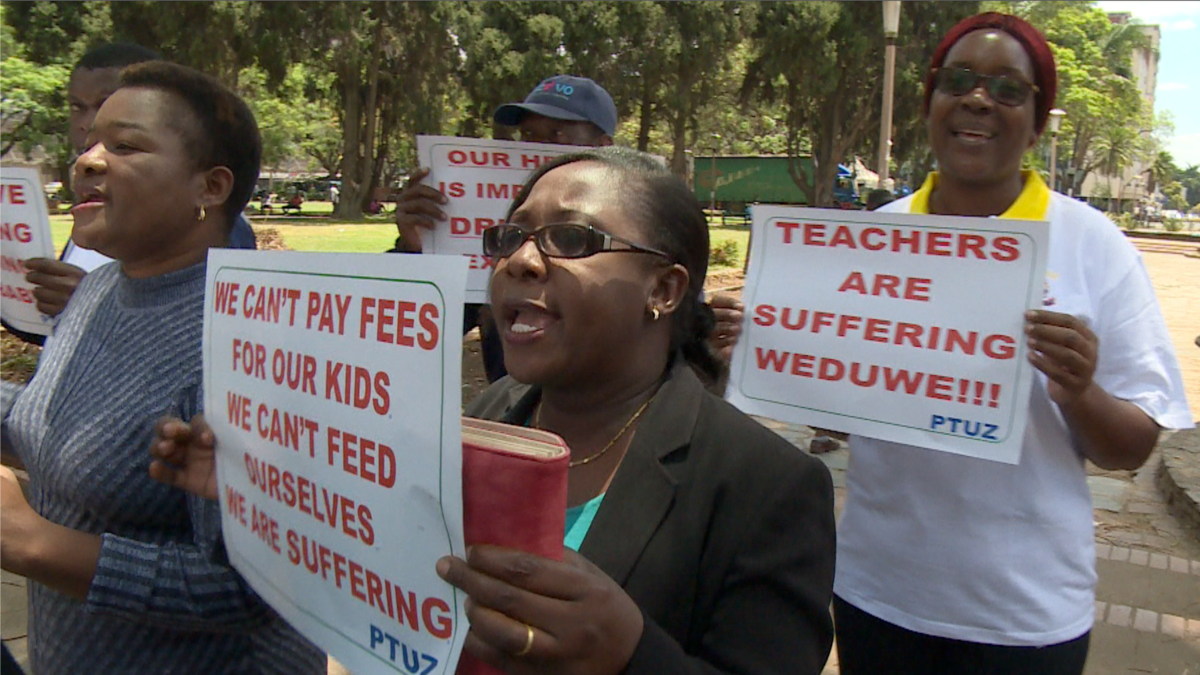
A Serious fallout is simmering among unions representing teachers over differences in tactics to force the government to give in to their demands when schools open tomorrow.
The friction has resulted in the unions splitting into two different camps — Federation of Zimbabwe Educators Union (Fozeu) and the Federation of Educators Union of Zimbabwe (Feuz).
Fozeu members are Amalgamated Rural Teachers Union of Zimbabwe (Artuz), Educators Union of Zimbabwe (EUZ) Zimbabwe Visually Impaired Teachers Union and Professional Educators Union of Zimbabwe
Under the Feuz, there is the Zimbabwe Teachers Association(Zimta), Progressive Teachers Union of Zimbabwe (Ptuz), Teachers Union of Zimbabwe (TUZ), Zimbabwe Democratic Teachers Union (ZDTU), Zimbabwe National Educators Union (ZiNEU), Zimbabwe National Teachers Union (Zinatu), Zimbabwe Rural Teachers Union (Zirutu) and the Zimbabwe National Union of School Heads (Zinush) .
The Fozeu have declared industrial action when schools open tomorrow to press the government to pay teachers a minimum wage of US$1 260.
However, the Feuz, which has the majority of the teachers’ representatives, has stated that their members will report for duty to give room for dialogue.
Feuz is demanding a minimum wage of US$840.
Leaders of teachers unions have thrown accusations at each other as the government refuses to give in to their demands, with those opting for dialogue labelled sellouts.
- Hebrew scriptures: History of the Swastika
- Chinese firm to set up plant for Gwayi-Shangani pipeline
- Hebrew scriptures: History of the Swastika
- Furore over ‘exorbitant’ Cala charges
Keep Reading
The Progressive Teachers Union of Zimbabwe (Ptuz) pulled out from Fozeu following its decision not to negotiate for better salaries under the National Joint Negotiating Council (NJNC).
Fozeu chairperson, who is also Amalgamated Rural Teachers Union of Zimbabwe (Artuz) president, Obert Masaraure said they could not negotiate with the government because there was no forum for such negotiations to take place.
“We are not part of the NJNC because its establishment is unconstitutional,” Masaraure said.
“Our position at Fozeu is that we do not participate in the NJNC because it is a fraud.”
In a statement on Friday, Fozeu said it had resolved during the Workers Day celebrations to call for its members to down tools as schools open tomorrow.
But teachers represented under the Feuz said their members would report for duty tomorrow.
Feuz leader Akuneni Maphosa, who is also president of the Zimta, said they believed in progressive negotiations with the government for better salaries.
“As Feuz we have no position of a strike at the moment,” said Maphosa. “Our position is that unions must carry out their consultations. We are still following the trajectory of negotiation where we talk with the government and push for better salaries.
“We want US$840 as basic salary. We believe in consultations as the way to go at the moment.”
Ptuz secretary general Raymond Majongwe said the union was not apologetic about leaving Fozeu.
“We believe in collective efforts,” he said. “We must speak with one voice rather than going separate ways. We need to unite workers.
“We are a very small working class, so if we are going to create so many splinters, we are not doing justice to our cause. The employer will be threatened if we speak with one voice and act collaboratively."
The government in March offered teachers and other civil servants a US$20 pay increase and other incentives, such as free school fees for their children and housing loans.
But the teachers have rejected that offer as insignificant.
In 2022, authorities suspended striking teachers for three months without salaries in a pay dispute.
The pay dispute goes back to October 2018, when the government stopped paying teachers in United States dollars, switching to the reintroduced Zimbabwean dollar in 2019.










